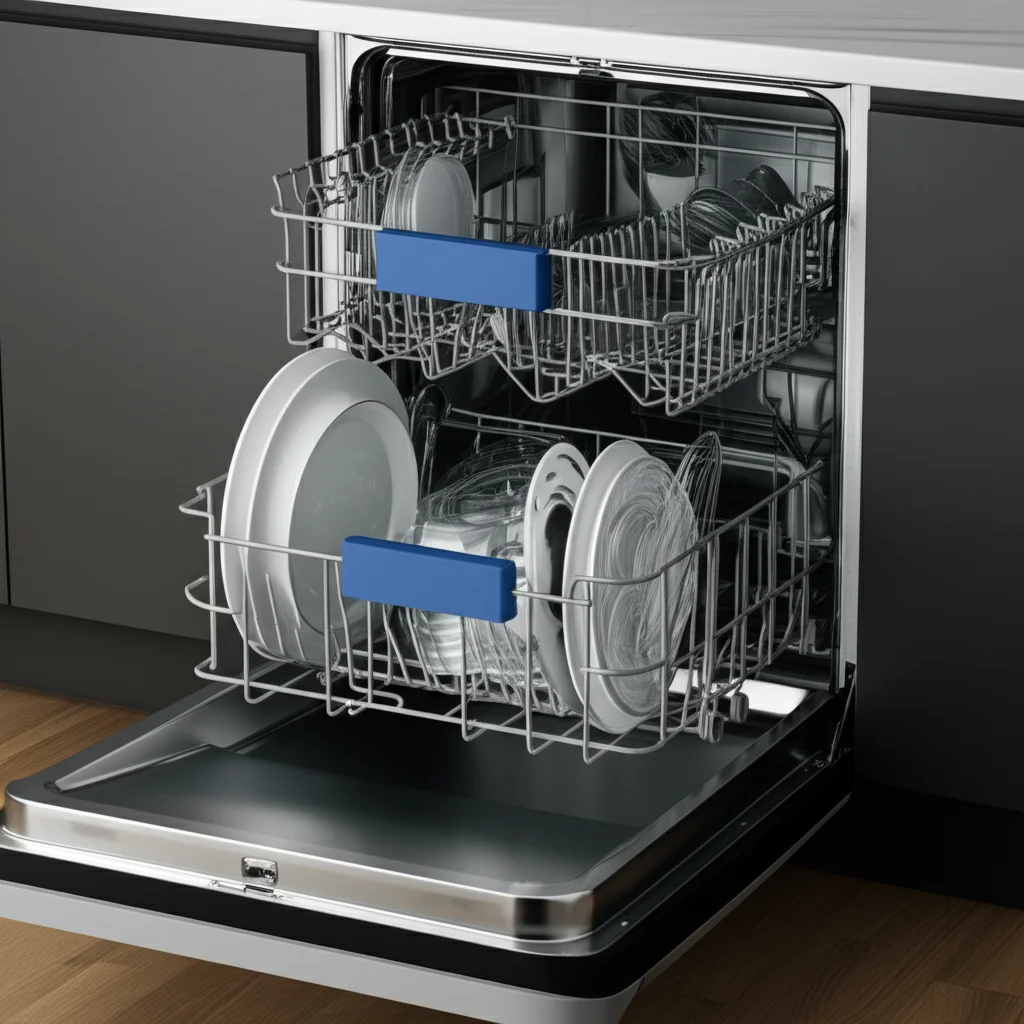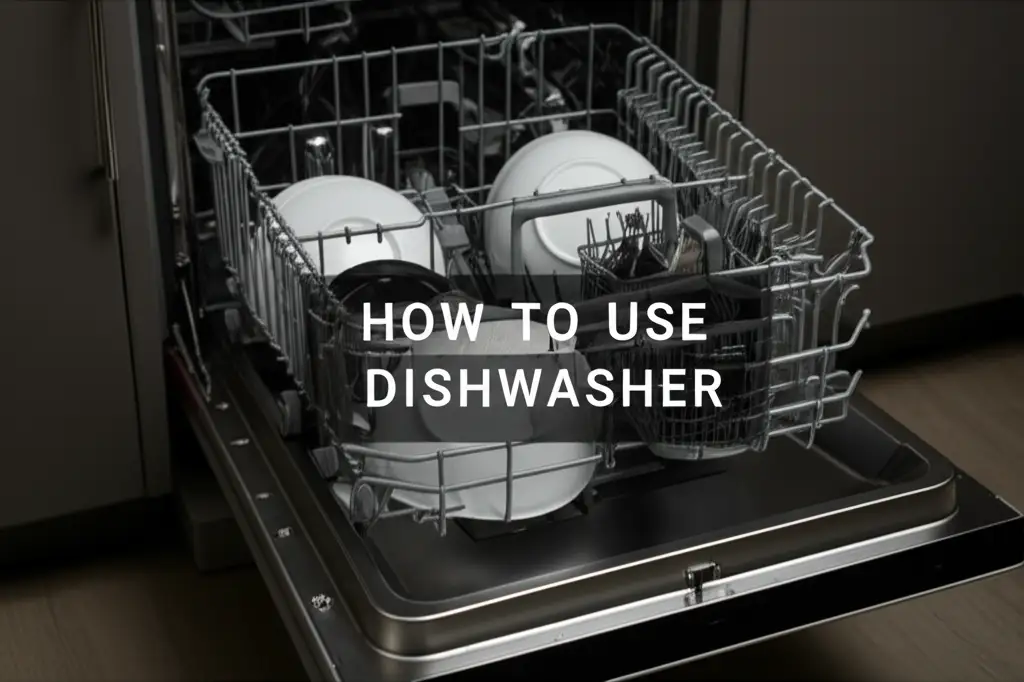· Katria Melrose · Home Appliances · 13 min read
What Is The Decibel Rating On Dishwashers

Understanding Dishwasher Decibel Ratings: Your Guide to Quiet Appliances
Imagine this: You have guests over, dinner is done, and the dishwasher starts. A loud, rumbling machine can disrupt conversations or spoil the peace of your home. Dishwasher noise levels are important for many households. Modern living spaces often blend kitchens with living areas. This means appliance sound matters more than ever before. Knowing the decibel rating on dishwashers helps you pick the right model.
I often think about how much noise our appliances make. A quiet home creates a more relaxing atmosphere. This article will explain what decibel ratings mean for dishwashers. We will explore good decibel ranges and discuss factors affecting noise. You will also learn how to find this information and reduce noise. My goal is to help you choose a dishwasher that brings quiet efficiency to your kitchen.
Takeaway
Choosing a quiet dishwasher improves home comfort.
- Decibel (dB) ratings measure sound intensity; lower numbers mean quieter operation.
- Dishwashers typically range from 38 dB (very quiet) to over 60 dB (noisy).
- Look for models below 45 dB for a noticeable difference in quietness.
- Tub material, insulation, and motor type greatly influence noise levels.
- Proper installation and maintenance can also help reduce sound.
What is the decibel rating on dishwashers?
The decibel rating on dishwashers measures the sound level they produce during operation. This measurement, expressed in decibels (dB), indicates how loud the appliance will be. A lower decibel number means a quieter dishwasher. This rating helps consumers compare different models and choose one that fits their home’s need for quietness.
What Does a Decibel Rating Mean for Dishwashers?
Decibel ratings give a clear picture of a dishwasher’s sound output. A decibel, or dB, is a unit used to measure sound intensity. Sound levels are measured on a logarithmic scale. This means a small change in dB value represents a large change in perceived loudness. For example, a dishwasher rated at 50 dB is much louder than one rated at 40 dB. The difference between 30 dB and 40 dB is like comparing a whisper to a quiet conversation.
Understanding this scale helps you make informed choices. Most modern dishwashers operate within a specific range. You will often see numbers from the high 30s to the low 60s. Knowing these numbers helps you set expectations for your new appliance. The lower the number, the more likely you will forget the dishwasher is even running. For a deeper understanding of this measurement, learn what does decibel mean on a dishwasher? This understanding directly influences your home’s peace.
The decibel rating usually refers to the loudest part of the wash cycle. This includes filling, washing, and draining. Manufacturers test these levels under specific conditions. They want to give consumers an accurate comparison. Always check the official decibel rating before you buy. This ensures you get the quiet performance you expect.
Ideal Decibel Ratings: How Quiet is Quiet?
When looking for a new dishwasher, ideal decibel ratings vary based on your personal preference. Generally, dishwashers with decibel ratings below 45 dB are considered quiet. Many premium models boast ratings in the high 30s. This level is similar to a quiet library or a soft whisper. Such a dishwasher will be barely noticeable in most homes.
A dishwasher around 50 dB is still common. This level is comparable to light rainfall or a quiet office. It is noticeable but not overly disruptive for many people. If your kitchen is separate from living areas, this level might be acceptable. However, for open-concept homes, it may feel too loud. Many people find 50 dB annoying, especially during quiet evenings.
For the quietest experience, aim for dishwashers in the 38-42 dB range. These appliances use advanced sound insulation and motor technologies. They allow you to run a load anytime without disturbing conversations or sleep. They truly redefine kitchen quietness. To explore this further, you might ask yourself, what decibel is quiet for a dishwasher? Your choice impacts daily life.
- 38-42 dB: Extremely quiet, almost silent, ideal for open-concept homes.
- 43-49 dB: Very quiet, generally not disruptive, good for most homes.
- 50-55 dB: Moderate noise, noticeable but tolerable, suitable for closed kitchens.
- Above 55 dB: Noisy, may disrupt conversations, often found in older or budget models.
Consider your home layout and lifestyle needs. A lower decibel rating always contributes to a more peaceful environment.
Factors Influencing Dishwasher Noise Levels
Several key factors determine how much noise a dishwasher makes. Understanding these elements helps you choose a quieter appliance. Manufacturers design dishwashers with sound reduction in mind. They use various techniques and materials to achieve lower decibel ratings.
Tub Material
The material of the dishwasher tub plays a big role in noise dampening. Stainless steel tubs generally offer better sound insulation than plastic tubs. Stainless steel absorbs sound vibrations more effectively. It creates a quieter wash cycle. Plastic tubs tend to resonate sound more, making the dishwasher louder. They might be cheaper but often compromise on quietness. Consider this factor if silence is a top priority. My experience shows stainless steel tubs offer a noticeable difference. You might wonder, are plastic tub dishwashers bad? The answer often depends on your noise tolerance.
Insulation
High-quality sound insulation is crucial for quiet operation. Dishwashers with lower decibel ratings often have multiple layers of insulation. This can include bitumen sheets, cotton, or asphalt material wrapped around the tub. These layers absorb noise and vibration before it leaves the appliance. Better insulation means more effective sound trapping. It prevents motor and water sounds from escaping into your kitchen.
Motor Type
The type of motor also impacts noise. Modern dishwashers often feature brushless motors. These motors operate more smoothly and quietly than older, brushed motor designs. They have fewer moving parts, which reduces friction and sound. Direct drive motors are another quiet option. They connect directly to the pump, minimizing noise from belts or gears. Choosing a dishwasher with an advanced motor helps ensure quiet cycles.
Installation
Proper installation significantly affects a dishwasher’s noise level. An appliance not leveled correctly can vibrate and create extra noise. Securely mounting the dishwasher to the countertop and floor reduces movement and rattling. Leaving proper clearance around the dishwasher also helps. A tight fit can create resonance. Always follow installation instructions carefully for optimal quietness. A well-installed dishwasher performs better and quieter.
Why a Quiet Dishwasher Matters in Your Home
A quiet dishwasher is more than just a luxury; it significantly impacts your daily home life. In modern homes, especially those with open-concept designs, the kitchen often flows directly into living and dining areas. Noise from appliances carries easily. A noisy dishwasher can disrupt family conversations, television watching, or even remote work. Imagine trying to talk over a loud machine during dinner; it is not pleasant.
For many of us, the kitchen is the heart of the home. It is where we gather, cook, and entertain. A loud dishwasher can detract from this central space. It forces you to postpone running loads until everyone is asleep. This limits your flexibility. A quiet model means you can run it anytime, day or night. It does not matter if someone is sleeping, working, or relaxing nearby. This freedom makes life much easier.
Furthermore, a peaceful environment promotes relaxation and well-being. Constant background noise contributes to stress and fatigue. By choosing an appliance with a low decibel rating, you contribute to a calmer home. This is especially true for families with young children or those who spend a lot of time at home. A silent wash cycle provides true peace of mind. I find great joy in a quiet home.
- Open-Concept Living: Noise travels between kitchen, living, and dining spaces.
- Family Life: Avoids disrupting conversations, homework, or movie nights.
- Work-from-Home: Prevents distraction during calls or focused work.
- Flexible Scheduling: Run the dishwasher anytime, day or night, without disturbance.
- Overall Comfort: Contributes to a more peaceful and relaxing home environment.
Investing in a quiet dishwasher enhances the quality of your home life. It is an investment in comfort and convenience.
How to Find the Decibel Rating When Buying a Dishwasher
Finding the decibel rating for a dishwasher is straightforward if you know where to look. Manufacturers understand that quietness is a major selling point. They usually make this information easy to access. Knowing where to find this number helps you compare models effectively. You can then make an informed choice for your home.
When shopping in a store, check the appliance’s specifications tag. This tag is often displayed directly on the dishwasher itself. It lists key features, energy efficiency, and typically includes the decibel rating. It is often prominently featured, as manufacturers highlight quieter models. Do not hesitate to ask a sales associate if you cannot find it. They should be able to point it out.
If you are shopping online, the decibel rating is usually found on the product page. Look under the “Specifications,” “Features,” or “Tech Specs” tabs. Online retailers list this detail alongside dimensions, cycle options, and energy consumption. It is a standard piece of information for major appliances. Compare various models side by side on different websites. This allows you to quickly see which one offers the lowest noise level.
You can also consult the Energy Guide label. This yellow label found on many appliances provides energy consumption details. It also often includes the appliance’s decibel rating. This label offers a quick way to compare both energy efficiency and noise output. Finally, checking manufacturer websites directly guarantees accurate information. Their product pages always feature comprehensive specifications.
Tips for Reducing Dishwasher Noise
Even if you already own a dishwasher, or just want to maximize the quietness of a new one, several tips can help reduce noise. Proper usage and maintenance play a significant role. Small adjustments can make a noticeable difference in your kitchen’s sound levels. I find these simple steps truly help.
First, proper loading is crucial. Do not overcrowd your dishwasher. Overlapping dishes can block spray arms, making them hit items. This creates clanking and rattling noises. Distribute items evenly. Make sure nothing obstructs the rotating spray arms. Also, ensure lightweight plastic items are secure. They can flip over and fill with water, causing splashing. Place them on the top rack and use clips if needed.
Second, regular maintenance helps keep your dishwasher running quietly. Check the spray arms for clogged holes. Food debris can block jets, leading to inefficient washing and increased noise. Clean the filter regularly. A dirty filter restricts water flow and can cause the pump to work harder, making more noise. Consult your owner’s manual for specific cleaning instructions. I try to clean my filter monthly.
Third, ensure proper installation. If your dishwasher shakes or rattles, it might not be level. Use a level tool to check. Adjust the leveling feet at the bottom of the unit. The dishwasher should be firmly secured to the underside of the countertop and to the floor. Loose screws or brackets can cause vibrations. Adding sound-dampening material around the dishwasher’s enclosure can also help. This is especially true for older, less insulated models.
Lastly, check for foreign objects. Sometimes small items like bottle caps or broken glass can fall into the bottom of the tub. These can get caught in the pump or spray arm, creating grinding or scraping noises. Always check the bottom of the tub and the filter before starting a cycle. Removing these objects quickly can prevent damage and reduce noise.
Comparing Dishwasher Brands and Their Quiet Offerings
When you look for a quiet dishwasher, some brands consistently rank high in noise performance. These manufacturers invest heavily in sound insulation, advanced motors, and quality materials. Knowing which brands prioritize quiet operation can narrow down your search significantly. My research consistently shows certain names excel in this area.
Bosch dishwashers are widely known for their exceptionally quiet operation. Many models boast decibel ratings in the low 40s or even high 30s. They often use multiple layers of sound insulation and brushless motors. Their design focuses on minimizing noise during every cycle. If silence is your top priority, Bosch is a strong contender. You might be interested to know, are Bosch dishwashers available now? The answer is generally yes, and they remain a popular choice.
Other brands also offer very quiet models. Miele dishwashers are another premium option known for their quietness and durability. They often feature robust construction and advanced sound dampening. KitchenAid and Whirlpool also produce lines of quiet dishwashers, particularly their higher-end models. These brands often integrate features like stainless steel tubs and efficient wash systems to reduce noise. GE Profile and LG Electronics have also introduced models with competitive decibel ratings. They focus on delivering a quiet experience for the modern home.
When comparing brands, always check the specific model’s decibel rating. While a brand might be known for quietness, individual models can vary. Read reviews from other users. Pay attention to comments about noise levels during different wash phases. Some dishwashers might be quiet during washing but noisy during draining. Look for a consistently quiet performance across all cycles. This careful comparison ensures you get the quiet appliance you truly desire.
FAQ Section
What is a good decibel rating for a dishwasher? A good decibel rating for a dishwasher falls below 45 dB. Models in the 38-42 dB range are considered excellent and nearly silent. Dishwashers around 50 dB are acceptable for some, but anything higher is generally considered noisy. The lower the number, the quieter your kitchen will be during operation.
Do quiet dishwashers cost more? Yes, quiet dishwashers generally cost more than their noisier counterparts. The reason is they use premium materials like stainless steel tubs, advanced insulation, and quieter motors. These components add to the manufacturing cost. The investment often pays off in increased home comfort and peace, especially in open-concept living spaces.
Can I make my existing dishwasher quieter? You can take steps to make an existing dishwasher quieter. Ensure it is properly loaded without overcrowding. Clean the filter and spray arms regularly to prevent clogs. Check if the dishwasher is level and securely installed to reduce vibrations. Adding sound-dampening mats around the exterior can also help, though results vary.
Does tub material affect dishwasher noise? Yes, the tub material significantly affects dishwasher noise. Stainless steel tubs naturally dampen sound better than plastic tubs. Stainless steel absorbs vibrations, leading to quieter operation. Plastic tubs tend to amplify sound. If quietness is important, choosing a dishwasher with a stainless steel tub is a smart decision.
What is the average decibel rating for dishwashers? The average decibel rating for new dishwashers typically ranges from 45 dB to 55 dB. While many budget models fall into the higher end of this range, premium and mid-range options increasingly offer ratings below 45 dB. Consumers often seek quieter models for improved home comfort.
Conclusion
Understanding the decibel rating on dishwashers is a powerful tool for any homeowner. It allows you to make an informed decision about one of your most used kitchen appliances. A quiet dishwasher dramatically improves the comfort and ambiance of your home. We have explored what decibel ratings mean, what constitutes a quiet dishwasher, and the factors that influence noise levels. From tub materials to motor types, every component plays a part in the overall sound output.
Remember that a quiet dishwasher brings significant benefits to your daily life. It enables flexible scheduling for washes and fosters a more peaceful environment. This is especially true for open-concept homes. I urge you to prioritize decibel ratings when shopping. Look for models in the 38-44 dB range for optimal quietness. Check product specifications online or in-store. Invest in proper installation and maintenance for continued quiet operation. Choose a dishwasher that cleans your dishes effectively and preserves the peace and quiet of your home. Start your search today for a quieter, more enjoyable kitchen experience!
- quiet dishwasher
- dishwasher noise
- appliance decibels





